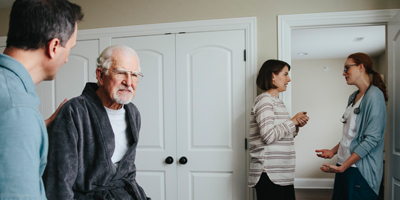Working with Care Providers
Leaving the person living with Alzheimer's or other dementia in the care of another is never an easy thing to do. But by working closely with providers and staying involved in care, you can help ensure all care needs of the person with dementia are being met.
Preparing care providers
 Caregivers should treat a whole person, not a patient. To help providers do this, familiarize them with the needs and history of the person with Alzheimer's. Tell them the person's place of birth, childhood memories, family stories, favorite hobbies, occupation, likes, dislikes, and morning and evening routines. Filling out our Personal Facts and Insights (PDF) sheet can help you organize this information.
Caregivers should treat a whole person, not a patient. To help providers do this, familiarize them with the needs and history of the person with Alzheimer's. Tell them the person's place of birth, childhood memories, family stories, favorite hobbies, occupation, likes, dislikes, and morning and evening routines. Filling out our Personal Facts and Insights (PDF) sheet can help you organize this information.
Care planning
A care plan is a written plan that documents the care and support needs of a person with Alzheimer's. An in-home care agency or care community will work with you to develop care plans for the person with dementia. You will provide insights about the person's preferences and routines. If possible, the person living with dementia should be involved in the care planning.
As the disease progresses, the person's needs will change and, in some cases, a particular type of care may no longer be suitable. As this occurs, the care plan will also change. Ask the care provider how often care plans are reviewed and care conferences are held.
Being involved in the care plan
People with dementia and their family members have a right to be included in care conferences. If necessary, ask to be included via a conference call.
Before the meeting:
- Ask that the meeting be held when you can attend.
- Request a copy of the current care plan so you can review it before the meeting.
- List the questions, changes, concerns or goals you'd like discussed.
At the meeting:
- Involve the resident as much as possible.
- Ask questions to make sure you understand everything.
- Take notes.
- Be sure you understand and agree with the care plan.
- Ask for a copy of the care plan.
Follow up:
- Stay involved in care. As the disease progresses, the person's needs will change.
- Log any reactions to the care plan, medication or treatment.
- Communicate regularly with the staff about the care plan.
- If the plan isn't working, ask for another care conference.
Communication
In care communities, care conferences are held routinely. The agenda includes discussing the person's health, medications and activities. The care conference is a good place to meet staff members, ask questions and raise concerns.
Addressing concerns
If you have concerns about the quality of care the person is receiving or if the care provider doesn't seem to be a good match, speak up. Having concerns about care can stir up strong emotions. Stay calm and respectful while addressing the issues, but stay firm and follow-up to make sure any problems have been addressed.
In-home health and adult day services
If you have in-home health through an agency or are using an adult day center, call and ask to speak with a supervisor or set up a meeting. The paid caregiver may need more training. Be sure to ask for a time frame in which you can expect to see results; if you don't see results as you anticipate, you may need to consider changing to a different care provider.
Long-term care communities
In a care community, you can address your concerns in regularly scheduled care conferences. Or, consider participating as a member of the community's family council. A family council is a group of family members and/or friends of residents who meet to discuss the nursing home. Staff members may or may not be involved. An assisted living community may have a family council or offer other means for families to discuss the community’s care. Ask to see if your community offers this; it can be another way to stay involved with care.
If you feel your concerns are not being heard and you can't resolve the issue within the community, you may want to work with an outside agency or person.
Here are some places to start:
- Your local chapter of the Alzheimer's Association can help you understand and evaluate good dementia care. Find your chapter.
- A long-term care ombudsman helps residents of care communities and their families keep their rights and resolve complaints. Locate an ombudsman.
- Your state licensing agency is responsible for complaint investigations. The agency can sanction communities (impose fines, limit admissions, etc.) that do not meet state and federal standards.
- Elder law attorneys respond to concerns about residents' rights and quality care. They also help in elder abuse and financial abuse cases. Not all attorneys specialize in elder law. So, ask a prospective attorney whether he or she regularly handles these matters. Use our Community Resource Finder to locate an elder law attorney.
Related Pages

The Alzheimer’s Association is in your community.
Find Your Local Chapter
Connect with our free, online caregiver community.
Join ALZConnected




